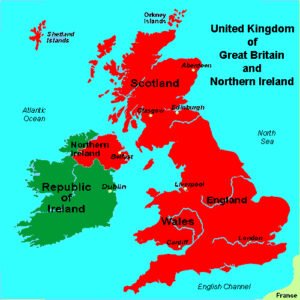
Why in news?
This month, Northern Ireland (NI) has established a new government following a hiatus between the two primary parties since the 2022 elections to the Stormont Assembly. Sinn Fein, a party advocating for Irish unity, secured the highest number of seats.
What is the historical context behind the political stalemate in Northern Ireland?
- The political deadlock in Northern Ireland arose due to disagreement over border controls post-Brexit.
- Being part of the UK and sharing a land border with an EU member state, the region encountered distinct challenges post-Brexit.
- The UK and the EU crafted the Northern Ireland Protocol to avoid a hard border, relocating the trade border to Irish ports and establishing a sea border between the region and the rest of the UK.
- The Democratic Unionist Party (DUP) opposed the protocol, considering it a threat to the UK’s integrity and a violation of the principles of the Good Friday Agreement.
- The DUP’s opposition led to their withdrawal from the power-sharing government.
- The deadlock was resolved through renegotiation of border controls and assurances about Northern Ireland’s status within the UK.
- Eventually, the DUP agreed to return to government after these renegotiations.
What is the Good Friday Agreement?
- Overview:
- The Good Friday Agreement, also known as the Belfast Agreement, was signed on 10th April 1998 in Northern Ireland.
- It aimed to end the violence and conflict that had afflicted the region, particularly during “The Troubles” period.
- Key Provisions:
- Power Sharing: Established a devolved government in Northern Ireland, with power shared between Unionists and Republicans to ensure representation for both communities.
- Consent Principle: Recognized the principle of consent, meaning any change in Northern Ireland’s status required majority approval from its people.
- Human Rights: Emphasized human rights and equality for all citizens of Northern Ireland regardless of background or political affiliation.
- Decommissioning of Weapons: Outlined a process for the decommissioning of weapons held by paramilitary groups, though immediate disarmament was not explicitly mandated.
- Cross-Border Cooperation: Encouraged cooperation and reconciliation between Northern Ireland and the Republic of Ireland, as well as between the UK and Ireland, promoting economic, social, and cultural ties while respecting the sovereignty of both states.
Key Facts About Northern Ireland:
- Location and Geography: Situated in the northeastern quadrant of the island of Ireland, it shares borders with the Republic of Ireland to the south and west. The Irish Sea separates it from England and Wales to the east and southeast, while the North Channel separates it from Scotland to the northeast.
- Political Status: It is a constituent country of the United Kingdom, alongside England, Scotland, and Wales. It is not a sovereign state but has its own devolved government within the framework of the United Kingdom.
- Capital and Major Cities: The capital city is Belfast, renowned for its modern infrastructure and rich industrial history, particularly in shipbuilding. Other major cities include Londonderry (also known as Derry) and Armagh.
- Cultural Contributions: It has made significant contributions to world culture, particularly in literature, music, and the arts. Notable figures include poet Seamus Heaney and musician Van Morrison.
- Economy: Historically reliant on industries such as shipbuilding and textiles, its economy has diversified in recent decades, focusing on technology, tourism, and services.
- Demographics: The population is diverse, with a mix of ethnicities, religions, and cultural backgrounds. Christianity is the predominant religion, with significant Protestant and Catholic communities shaping the region’s demographics.
People also ask
Q1. What is the political status of this region?
Ans: Northern Ireland is a constituent country of the United Kingdom, with its own devolved government. It is not an independent sovereign state but operates within the framework of the UK.
Q2. What are some notable cultural contributions from this region?
Ans: Northern Ireland has made significant contributions to literature, music, and the arts. Renowned figures include poet Seamus Heaney and musician Van Morrison.
3. How has the economy of this region evolved over time?
Ans: Historically reliant on industries like shipbuilding and textiles, Northern Ireland’s economy has diversified in recent years, with a focus on technology, tourism, and services.
Your point of view caught my eye and was very interesting. Thanks. I have a question for you.